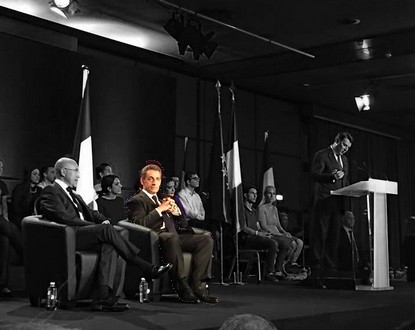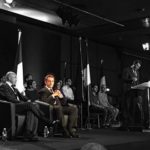Nicolas Sarkozy, after his return to politics to become president of the UMP or even better, a vast gathering that should embody a 21st-century political movement, is traveling across France to present his candidacy.
 Practically assured of his election, he is still playing a high-stakes game: with less than 70% of the votes in his favor, his presidency would be immediately weakened, especially in anticipation of the 2016 primary to select the right-wing (and center?) candidate for the 2017 presidential election.
Practically assured of his election, he is still playing a high-stakes game: with less than 70% of the votes in his favor, his presidency would be immediately weakened, especially in anticipation of the 2016 primary to select the right-wing (and center?) candidate for the 2017 presidential election.
This is why, relying on his popularity among the militants, his campaign is played almost entirely on the theme of the messiah’s return.
The script is all laid out: to position oneself at the center of the world, express ambition, and convey a sense of authority. The Warholian fifteen minutes of fame, in short.
Yesterday, it was Nice’s turn to host him: a full hall with the local leadership in the front line and 3,000 militants fascinated and spellbound even before the meeting began.
Introduced by Christian Estrosi, president of UMP 06, who wanted to remind everyone of the status and importance of the most influential federation in France (and certainly decisive for the election of the future president, while hoping for the regularity of the vote, given the precedent of 2012) and his unwavering friendship and loyalty to Nicolas Sarkozy, of whom he wishes to be a “vigilant support.”
The former President of the Republic, while expressing his gratitude to the Mayor of Nice, did not let it appear that he needed prompters or guards, giving the impression of having clear ideas and proposals in his mind.
In fact, a speaker could not hope for anything better when he knows that, whatever he says, he will be applauded by the audience. It is thus in this condition and in front of an audience entirely won over to his cause, for whom he is once again, well before 2017, “Sarko, President,” that the former head of state found it challenging to play the constrained role of candidate for the UMP presidency election, scheduled for the next November 29th.
He just referred to a vision and a project to build, which has all the appearances of a lark’s mirror: The new party will be composed of him and a few loyalists, of the 21st century; it will have only the shell because it will need to be a docile and useful tool for any other objective.
His mind is already on the presidency of 2017, which for him, more than a revenge, will be the culmination of catharsis.
Seasoned in the profession, Nicolas Sarkozy delivers, in friendly demagogue fashion, a speech very anchored on the right, telling his voters what they wanted to hear.
In this land where the extreme right achieves great scores, he endeavored to reassure his militant base, presenting very firm proposals. He developed a theory of the “true” people, dear to the proponents of national identity. The candidate Sarkozy thus found the tones of his 2012 presidential campaign again.
It is known that the defeated always blame their loss on the electorate, which they accuse of being mistaken. This is evidently the case with Nicolas Sarkozy, who dismissed any review of his previous term.
He called on his right-wing rivals to rally… naturally behind him: “I want us to find the will to work together amongst us. We may have differences, but we are from the same family (…) Now is not the time for the expression of individual ambitions,” he said with the poise of an experienced actor.
Not forgetting to stage the rallying of Alpes-Maritimes deputy Eric Ciotti in his favor, whereas he had been supporting François Fillon since the summer of 2012.
In the end, it’s still the same Sarkozy: He divides, galvanizes his own and annoys the others, and accentuates the divisions of French society on which he plays his part and fortune: lessato ma non satiato (exhausted but not sated), wrote the Latin poet Juvenal.
While saluting the artist, one cannot help but feel that the right deserves better for the years to come.



